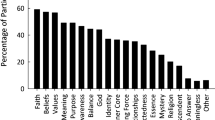Abstract
This is a two-phase study on attitudes of medical students toward Alcoholics Anonymous. The first phase compares views of addiction faculty to third-year medical students on the importance of spirituality in addiction treatment. We administered a questionnaire to assess attitudes toward spiritual, biological, and psychosocial approaches to addiction treatment. The faculty viewed spirituality as relatively more important in addiction treatment than did the students. The second phase was designed to assess whether medical student attitudes toward spiritually based treatments changed over the course of a psychiatry clerkship. At the beginning of the clerkship, students rated a spiritually oriented approach as important in addiction treatment as a biological approach, whereas, at the end of the clerkship, they rated the biological approach as more important. It may be important to educate medical students about the spiritual dimensions of recovery so they can integrate this into their treatment of addiction.
Similar content being viewed by others
References
Galanter M, Kaufman E, Tintor Z, Robinowitz B, Myer RE, Halikas J: The current status of psychiatric education in alcoholism and drug abuse. Am J Psychiatry 1989; 146:35–39
Isaacson JH, Flemming M, Kraus M, Khan R, Mundt M: A national survey of training in substance use disorders in residency programs. J Stud Alcohol 2000; 61:912–915
Kinney J, Bergen BJ, Price TR: A perspective on medical students' perceptions of alcoholics and alcoholism. J Stud Alcohol 1982; 43:488–496
Hanlon MJ: Review of the recent literature relating to the training of medical students in alcoholism. J Med Educ 1985; 60:618–626
Galanter M: Spiritual recovery movements and contemporary medical care. Psychiatry 1997; 60:211–223
Goldfarb LM, Galanter M, McDowell D, Lifshutz H, Dermatis H: Medical student and patient attitudes toward religion and spirituality in the recovery process. Am J Drug Alcohol Abuse 1996; 22:549–561
Sheller J: Spirituality in America. US News & World Report. 2002; May 6: 40–45
Puchlski CM, Larson DB: Developing curricula in spirituality and medicine. Acad Med 1998; 73:970–974
Josephson A, Larson D, Juthani N: What's happening in psychiatry regarding spirituality? Psychiatr Ann 2000; 30:533–541
Accreditation Council for Graduate Medical Education: Special Requirements for Residency Training in Psychiatry. Chicago: Accreditation Council for Graduate Medical Education; 1994; 11–12, 18
Karnitschnig A: Alcoholics Anonymous in medical school education. Fam Med; 1989; 21:146–147
Chez R, Jonas B, Crawford C: A survey of medical students' opinions about complementary and alternative medicine. Am J Obstet Gynecol 2001; 185:2–9
Fleming MF, Manwell LB, Kraus M, Isaacson JH, Kahn R, Stauffacher EA: Who teaches residents about the prevention and treatment of substance use disorders? A national survey. J Fam Pract 1999; 48:725–729
Chibnall JT, Duckro PN: Does exposure to issues of spirituality predict medical students' attitudes toward spirituality in medicine. Acad Med 2000; 75:661
Santiesteban AJ: The use of psychological models in medical education. J Med Educ 1975; 50:636–637
Alger I: Stimulus tapes on attitudes, supervision, and stereotypes. Hosp Community Psychiatry 1984; 35:984–985
Hyler SE, Schanzer B: Using commercially available films to teach about borderline personality disorder. Bull Menninger Clin 1997; 61:458–468
Dhir A, Shirali KA: Effect of psychiatric education on attitude of medical students towards the mentally ill. Indian J Clin Psychol 1978; 5:173–178
Neumann M, Elizur A, Bawer A: Changing medical students' attitudes and professional behavior toward mental patients as a function of psychiatric clerkship. Isr J Psychiatry Relat Sci 1984; 21:235–246
Pokorny A, Punam P, Fryer J: Drug abuse and alcoholism teaching in the U.S. medical and osteopathic schools. J. Med Educ 1978; 53:816–824
Targ E: A curriculum on spirituality, faith and religion for psychiatric residents. Psychiatr Ann 1999; 29:485–488
Puchalski CM, Larson DB, Lu FG: Spirituality courses in psychiatry residency programs. Psychiatr Ann 2000; 30:543–548
Oldham SB, Sipe R: An experiential training program and medical students' attitudes toward patients with chemical dependency. Acad Med 1990; 65:421–422
Author information
Authors and Affiliations
Corresponding author
About this article
Cite this article
Fazzio, L., Galanter, M., Dermatis, H. et al. Evaluation of Medical Student Attitudes Toward Alcoholics Anonymous. Subst Abus 24, 175–185 (2003). https://doi.org/10.1023/A:1025062211581
Issue Date:
DOI: https://doi.org/10.1023/A:1025062211581




